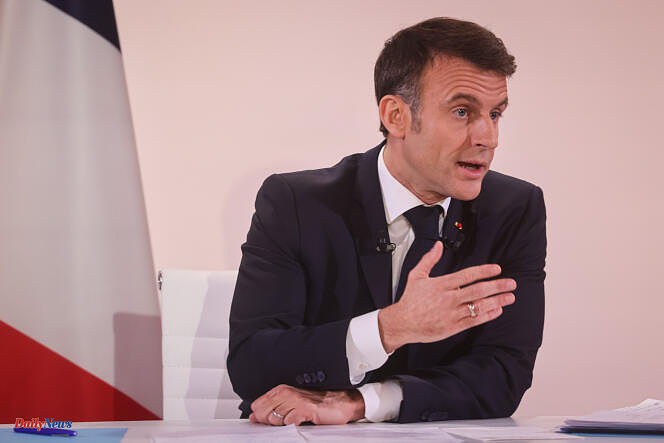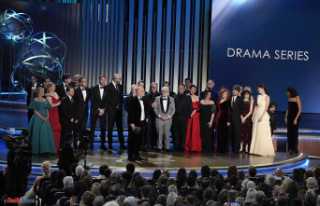In front of an almost entire government team and numerous journalists gathered in the Elysée party room, the President of the Republic, Emmanuel Macron, made numerous announcements on Tuesday, January 16 in the evening, during the two hours and twenty minutes of a press conference broadcast on television, to promise “a fairer and stronger France”.
A week after the appointment of a new government, the Head of State wanted to set his course, "to state the deep meaning" of his action, before the Prime Minister, Gabriel Attal, details his roadmap, on 30 January, in front of Parliament, during his general policy speech.
Emmanuel Macron urged his troops to “dare what we no longer even dared to think”, without “being afraid of raising certain discontent”. “I am convinced” that “our children will live better tomorrow than we live today,” he assured.
Here are the different points addressed by the Head of State.
Emmanuel Macron began his press conference by announcing that he intended to regulate the use of screens "for our children", on the basis of a report of experts that he recently brought together, not excluding that there are “prohibitions” and “restrictions”.
He also announced a series of measures on education, such as doubling the teaching of civic education from the fifth grade and experimenting with single outfits. Around a hundred voluntary schools will be affected this year, before a generalization in 2026 if the results are conclusive.
Emmanuel Macron also said he was “totally in favor of learning La Marseillaise in primary school”. He also spoke out for more cultural and artistic education, with an emphasis on theater, and for the reinstatement of graduation ceremonies “starting this year” at college. In high school, universal national service in second grade should be generalized.
In the midst of controversy over the comments of his new Minister of National Education, Amélie Oudéa-Castéra, on “the packets of hours not seriously replaced” among the public, the Head of State assured that his government would “continue to forcefully tackle” unreplaced hours at school.
Ten “clearance” operations will be carried out each week against drug trafficking, “in all categories of city”, with the objective of restoring “order”. Emmanuel Macron also recalled his desire to “fight against incivility through a doubling of the police presence in our streets” and he said he wanted to fight against “radical Islam”, referring in particular to the legislation which made it possible to put an end to “radical Islam”. to the system of seconded imams” since January 1 of this year.
The President of the Republic also delivered announcements aimed at boosting the birth rate. A new “birth leave”, “better paid and which will allow both parents to be with their child for six months” will be created, to replace parental leave.
Emmanuel Macron also unveiled the launch of a “major plan” against infertility, which was expected and provided for by the bioethics law of 2021.
The Head of State asked his government for measures to “earn a better living through work”, but also mentioned negotiations in certain branches “so that the salary dynamic matches the efforts. » He also wanted civil servants to be paid more “on merit”.
Emmanuel Macron also announced that the tax cut of 2 billion euros that he plans for the middle classes would take place from 2025. He also affirmed that the price of electricity would “return to normal”, while by ensuring that it would remain “substantially lower” than what is paid by the consumer in our European neighbors.
To “put an end to the scandal of medical deserts”, the President of the Republic requested the regularization of “a number of foreign doctors”. On the other hand, he declared himself opposed to the regulation of the installation of practitioners, believing that “constraint” was not “the right solution”.
Emmanuel Macron also defended a doubling of medical deductibles, from 50 euro cents to 1 euro, judging that this increase in the remaining cost was a “good measure” to increase the responsibility of those with social insurance.
The tenant of the Elysée will announce "from the summer the main axes for the next eight" EPRs - the new generation reactors -, as part of the relaunch of nuclear power, after the launch of six new EPRs.
While the National Rally dominates the polls six months before the European elections – they will be held in June – Emmanuel Macron accused the movement of Marine Le Pen, chaired by Jordan Bardella, of being the “party of collective impoverishment”. and “lies”, also calling for “attacking what makes people vote for them”.
“Fighting against illegal immigration is, I think, one of the responses to the National Rally,” assured the President of the Republic, also highlighting the fight against “mass unemployment” and calling for a remedy to “ feeling of dispossession” that the French can feel.
The head of state responded to criticism of his new ministers. He notably defended Amélie Oudéa-Castéra, who was “right to apologize” for her “awkward remark” on the subject of her children’s private schooling. The president rejected any “conflict” between private schools and public schools. Regarding children's schooling, "we don't judge people on their individual choices," he said.
He also defended the appointment to the Ministry of Culture of Rachida Dati, coming from the right, saluting “her energy, her talent, her freedom”, despite her indictment in a case of alleged corruption in the Carlos Ghosn affair. “There are no rules which mean that an indicted minister should leave the government,” assured Emmanuel Macron, believing that “justice must do its work with serenity.”
The head of state assured that he had not spoken about the next municipal elections in Paris with Rachida Dati.
Emmanuel Macron affirmed to have "no regrets" for having defended the presumption of innocence of Gérard Depardieu, indicted for "rapes" and targeted by several complaints, while regretting not "having said enough how much the words of the women” victims of violence “is important”.
Emmanuel Macron also addressed international issues, believing that Israel's pursuit of insufficiently targeted operations in Gaza constituted "a long-term risk for the security" of the country. “We will continue diplomatic initiatives, resolutions, discussions to call a ceasefire and I will continue bilateral contact to try to obtain it in a very concrete way,” he said.
The President of the Republic also announced that Paris had “decided not to join” the strikes of the American-British coalition against the Houthis in Yemen “to avoid any escalation”.
In addition, Emmanuel Macron announced the organization, on February 7, of a tribute to the victims of the attack by the Palestinian movement Hamas in Israel, perpetrated on October 7, 2023, recalling that France had “lost 41 of its children” in this unprecedented assault, and that she had “three more hostages” in the Gaza Strip.
Finally, the Head of State said that he would go to Ukraine “in February” and that France would deliver to this country forty new long-range Scalp missiles and “hundreds of bombs” to continue to resist attacks. Russians.
France and the European Union “will have to make new decisions in the coming weeks and months, precisely so as not to let Russia win,” he added. “The very security of Europe and the entire Russian neighborhood would be called into question,” warned Emmanuel Macron.












